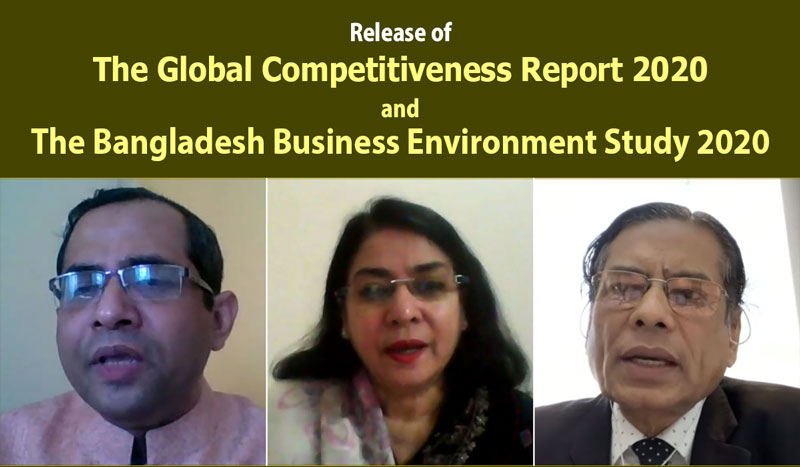
Inefficient bureaucracy has emerged as the top barrier to pursue business activities in the country. This has been revealed by the executive opinion survey conducted by the Centre for Policy Dialogue (CPD) as part of the Global Competitiveness Report (GCR) 2020. Majority of institutional and governance related indicators such as burdensome administrative requirement, difficulty in challenging government decisions, unofficial transactions in public service delivery, has further deteriorated in 2019. Overall, weak public service delivery—due to lack of efficiency, transparency and accountability—is the major factor responsible for poor condition of governance.
These major findings were revealed at the media briefing on the release of the GCR 2020 and Bangladesh Business Environment Study 2020 on Thursday, 17 December 2020. The event was organised virtually by the CPD as part of the global release of the GCR which was held on 16 December, 2020.
This year’s report, the GCR 2020, is a special edition. Given the challenges facing all economies affected by the pandemic shock, the Special Edition does not provide comparative rankings. Instead, it draws out policy implications from the data for different countries and the respective leaders as they prepare for the economic revival. The analysis has been carried out on 37 economies. And 11 prioritised areas identified to measure countries readiness for economic revival.
Six country-specific features have been identified by the GCR 2020 as reasons for better preparedness for revival and recovery of selected economies. These include: (a) Countries with advanced digital economies and digital skills; (b) Countries with robust economic safety nets; (c) Countries with strong financial systems; (d) Countries that could successfully plan and integrate health, fiscal and social policies; and (e) Countries with previous experience of coronavirus epidemics (e.g. SARS) had better protocols and technological systems. The report estimates that a 10% increase in readiness scores could lead to a $300 billion increase in the GDP figures of the 37 countries combined.
Bangladesh has experienced positive changes in case of infrastructure development during 2019. All major infrastructure-related indicators such as road, rail, air transport and water supply facilities have perceived to be improved in 2019. Thus, inadequacy of infrastructure which was earlier considered to be one of the top three problematic factors for doing business, has receded to the fourth position this year, for the first time.
COVID-19 pandemic has widened the digital divide in the country which needs to be reduced through enhancing public and private investment targeting different marginalised groups as well as availing new business opportunities. With large productivity and profitability gaps between the top companies and all others in each sector, market concentration is on increasing trend in advanced economies. This is likely to be further aggravated during COVID-19 pandemic period. . Targeted small and medium enterprise (SME) support programme and mandatory SME participation in different value chains (including public procurement) are urgently needed.
Dr Fahmida Khatun, Executive Director, CPD, delivered introductory remarks at the beginning of the event. Dr Khondaker Golam Moazzem, Research Director, CPD, presented the GCR 2020 to the media along with “Bangladesh Business Environment Study 2020”. Professor Mustafizur Rahman, Distinguished Fellow, CPD, was present at the event.
The GCR, the flagship publication of the World Economic Forum (WEF), is a cross-country benchmarking analysis of the factors and institutions that determine long-term growth and prosperity of countries. The CPD has been partnering with the WEF in preparing the Bangladesh report since 2001.
In his presentation, Dr Moazzem explained the top three problematic factors in 2019 for doing business in the country—inefficient government bureaucracy (72%), corruption (68%), and limited access to finance (66%). Dr Fahmida indicated that an efficient public service delivery needs to be ensured through reducing institutional and operational bottlenecks.
The analyses reveal that the domestic competitive environment has been adversely affected due to pandemic and would further marginalise the SMEs. In fact, businesses are almost unprepared for the next decade’s challenges and necessary investment on digital technologies and R&D have not been made. Public policy support is highly inadequate, public-private partnerships are scant and a section of private sector is unaware about those future challenges and opportunities. So, businesses are largely unprepared for the post-COVID challenges on digital technologies. Professor Mustafiz indicated that higher investment for technological upgrading should be accompanied by investment in skill development so that the risk of ‘job-less’ growth could be reduced.
Dr Moazzem recommended that the country needs to take the lessons from the world, Bangladesh needs to undertake major initiatives for sustainable recovery in the post-COVID period through four targeted measures: (a) Transforming the enabling environment; (b) Transforming human capital; (c) Transforming markets; and (d) Transforming the innovation ecosystem.
The briefing was followed by a Q&A session with journalists from print and electronic media.


